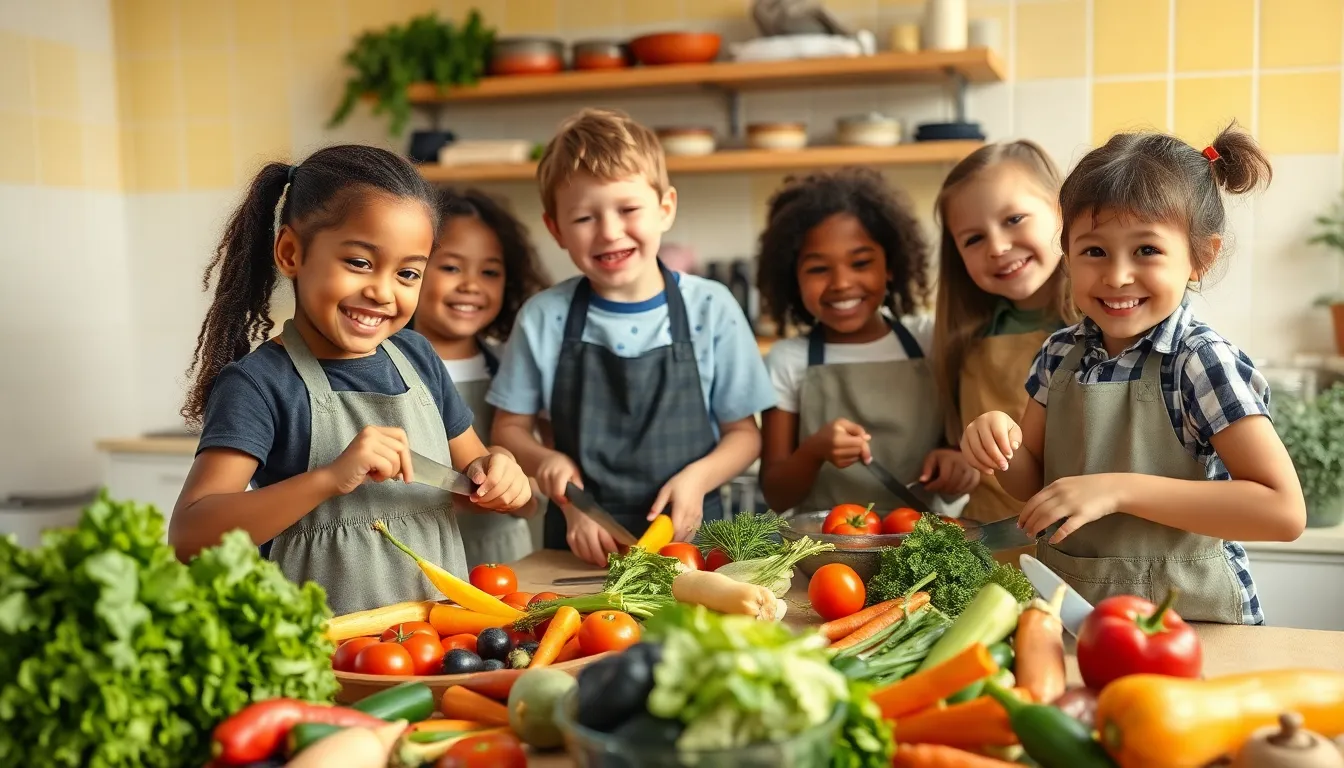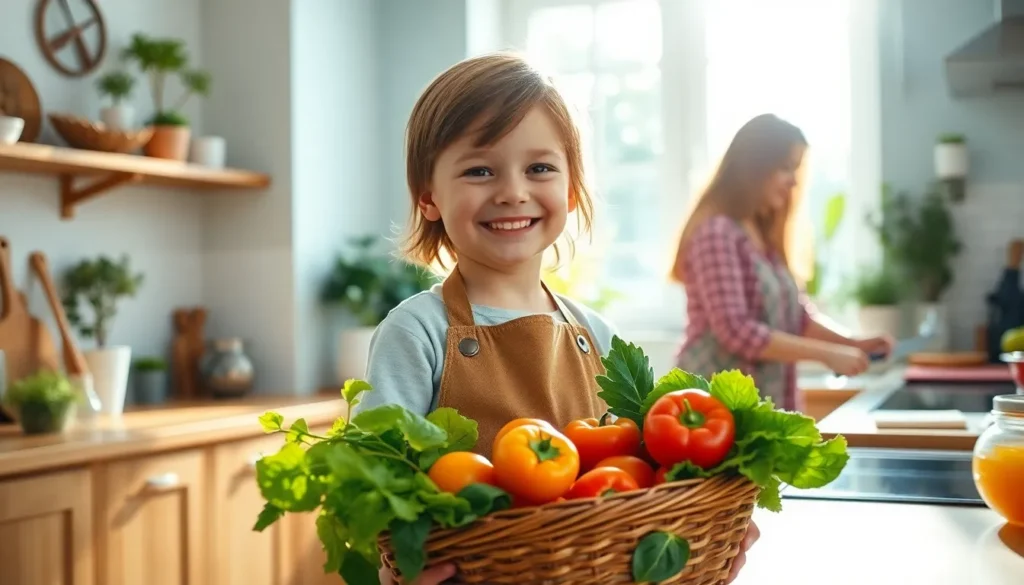Table of Contents
ToggleIn a world increasingly focused on environmental responsibility, teaching kids about sustainable cooking is more important than ever. By introducing children to eco-friendly practices in the kitchen, parents can instill lifelong habits that promote health and conservation. Sustainable cooking not only emphasizes the use of fresh, local ingredients but also encourages minimizing waste and energy use.
Engaging kids in the cooking process can spark their interest in nutrition and the planet. From growing their own herbs to understanding where food comes from, children gain valuable skills that empower them to make informed choices. This journey into sustainable cooking can be a fun and educational experience, fostering a sense of responsibility toward the environment while creating delicious meals together.
Importance Of Sustainable Cooking For Kids
Sustainable cooking plays a crucial role in shaping the habits and values of children. Teaching kids about eco-friendly practices in the kitchen fosters a strong connection to the environment. Engaging with fresh, local ingredients leads to healthier eating choices and supports local farmers.
Sustainable cooking reduces food waste, promoting efficiency in meal preparation. By understanding portion sizes and proper storage techniques, children learn to minimize leftovers and decrease disposal impacts. This knowledge translates into lifelong habits that encourage resourcefulness and responsibility.
In addition, children gain essential cooking skills through sustainable practices. Learning to prepare meals equips them with confidence and independence in the kitchen. As they experiment with different ingredients, kids develop their palates and make informed food choices.
Sustainable cooking also promotes creativity. Kids can explore various flavors and textures, making meals enjoyable to prepare and consume. This creative process nurtures a sense of accomplishment and pride in their culinary efforts.
Finally, teaching children about sustainability reinforces global awareness. Understanding the environmental effects of food production fosters a respect for nature. Children equipped with this knowledge are more likely to make choices that contribute positively to the planet.
Benefits Of Sustainable Cooking

Sustainable cooking offers numerous advantages that benefit both children and the environment. By engaging in eco-friendly cooking practices, kids develop healthy habits while fostering a deep connection to the planet.
Environmental Impact
Sustainable cooking significantly reduces the carbon footprint associated with food preparation. Choosing local ingredients cuts down on transportation emissions. Implementing seasonal eating minimizes the reliance on out-of-season produce, which often requires extensive energy for growth and shipping. Teaching children to compost food scraps encourages waste reduction, further promoting resourcefulness. Additionally, emphasizing less packaging supports initiatives aimed at decreasing plastic pollution. By understanding their role in environmental stewardship, children become advocates for sustainability.
Health Advantages
Sustainable cooking prioritizes nutrition, leading to improved health outcomes for children. Fresh, local ingredients often contain higher nutrient levels compared to processed foods. Cooking at home allows for better control over ingredients, reducing unhealthy additives and excess sugars. Engaging kids in meal preparation promotes healthier eating habits, encouraging them to try new foods and flavors. Teaching proper portion sizes helps combat overeating, instilling a sense of balance in their diet. Furthermore, increased awareness of food origins connects children to their meals, cultivating a long-lasting appreciation for nutritious choices.
Fun And Engaging Sustainable Recipes
Sustainable cooking can be both enjoyable and accessible for kids. It encourages creativity while teaching essential skills and values.
Easy Breakfast Ideas
- Overnight Oats: Combine rolled oats, milk or non-dairy alternatives, and fresh fruits, such as berries or bananas, in a jar. Let kids customize their jars with nuts, seeds, or honey.
- Veggie Omelet: Involve children in beating eggs and chopping seasonal vegetables like bell peppers or spinach. Cook the mixture in a skillet for a nutritious breakfast packed with vitamins.
- Smoothie Bowls: Allow kids to blend their favorite fruits with yogurt and a handful of spinach. Top with granola, nuts, or seeds for added texture and flavor.
Creative Lunch Options
- Wrap It Up: Provide whole-grain wraps and let kids fill them with hummus, fresh vegetables, and lean proteins like turkey or beans. Encourage them to experiment with different flavor combinations.
- Quinoa Salad: Cook quinoa and mix it with diced tomatoes, cucumber, and a splash of lemon juice. Kids can help in measuring and stirring, engaging them in the preparation.
- DIY Pita Pockets: Fill whole-wheat pitas with seasonal produce and yogurt-based dressings. Let children create their own unique combinations, fostering a sense of ownership over their meals.
Teaching Kids About Sustainability
Teaching kids about sustainability involves integrating eco-friendly practices into their cooking experiences. This education shapes their understanding of food production and environmental responsibility.
Incorporating Lessons Into Cooking
Incorporating lessons into cooking enhances children’s understanding of sustainability. Engaging them in discussions about ingredients promotes awareness of farming methods, such as organic farming and crop rotation. Parents can explain the benefits of seasonal eating, illustrating how local foods reduce transportation emissions. Activities like visiting farmers’ markets allow children to connect with local producers, deepening their appreciation for fresh ingredients. Additionally, involving kids in meal planning teaches them to consider the environmental impact of their choices, fostering critical thinking and mindful consumption.
Connecting Food Choices To The Environment
Connecting food choices to the environment cultivates children’s awareness of sustainability. Discussing the concept of a carbon footprint enables kids to grasp how food production affects the ecosystem. Providing examples, such as choosing plant-based meals, illustrates how dietary shifts can reduce greenhouse gas emissions. Teaching concepts of food waste, including composting practices, empowers children to make responsible decisions about leftovers. By creating fun challenges, like reducing food waste during meal preparation, parents can encourage problem-solving skills and resourcefulness. This connection equips children with the knowledge to make environmentally conscious decisions throughout their lives.
Making Sustainable Cooking A Family Activity
Involving the entire family in sustainable cooking fosters a strong bond while teaching valuable lessons. Engaging children at various stages of food preparation boosts their understanding of cooking processes and eco-friendly practices.
- Choose Local Ingredients Together
Selecting ingredients from local markets introduces children to fresh produce and supports local farmers. Planning meals around available vegetables and fruits encourages seasonal eating habits.
- Plan Weekly Meals
Involving children in meal planning enhances their critical thinking about nutrition and food waste. Discussions about what items to include promote a sense of ownership and accountability in food choices.
- Create a Family Garden
Growing vegetables or herbs at home teaches children about the life cycle of plants. Gardening reinforces the importance of sustainable practices by emphasizing the effort that goes into food production.
- Teach Cooking Techniques
Demonstrating basics like chopping, mixing, and baking instills essential cooking skills in children. Working together on recipes encourages teamwork and confidence in the kitchen.
- Explore Recipes that Minimize Waste
Adopting recipes that utilize leftover ingredients highlights the importance of reducing food waste. Creative uses for scraps, such as vegetable stock from peels, instill a mindset of resourcefulness.
- Organize ‘Meatless Mondays’
Implementing meatless meals introduces children to plant-based diets while reducing their carbon footprint. Exploring various vegetarian recipes promotes creativity and curiosity about different cuisines.
- Incorporate Educational Activities
Pairing cooking with educational discussions about sustainability and nutrition reinforces important concepts. Activities like reading food labels and learning about organic farming deepen children’s understanding.
- Celebrate Cooking Achievements
Highlighting successful meal preparations enhances the sense of accomplishment among children. Family cooking nights can transform into memorable events, showcasing the rewards of sustainable choices.
Participating in these activities cultivates skills, instills values, and strengthens family ties, creating a legacy of sustainable cooking practices.
Sustainable cooking for kids is more than just a trend; it’s a vital lesson for the future. By engaging children in eco-friendly practices, parents can nurture a generation that values nutrition and environmental stewardship. Cooking together creates lasting memories while instilling essential skills and knowledge.
As kids learn to appreciate local ingredients and minimize waste, they develop healthier eating habits and a deeper connection to the planet. This comprehensive approach empowers them to make responsible choices throughout their lives. With creativity and collaboration in the kitchen, families can cultivate a legacy of sustainability that resonates for years to come.





